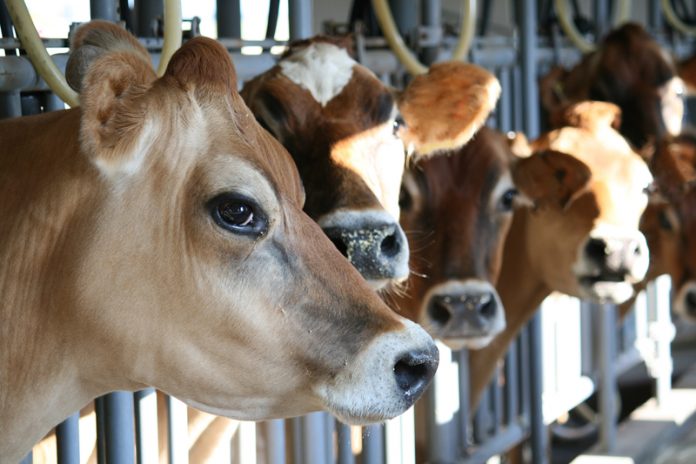Prof. Dr. Albert Sundrum, Head of Department Animal Health and Animal Nutrition at the University of Kassel highlights progress made by the organic dairy sector…
The organic dairy sector has been developing rapidly over the last decade. The existence of a premium price reflects (in part), the consumer expectation that animal health and welfare is better in organic than in conventional systems. An interdisciplinary EU-project (IMPRO) aims to promote and investigate alternatives using a farm centric and equifinal approach to reduce the prevalence of production diseases (PDs) in organic dairy farming. Results of on-farm assessments in four different European countries (DE, FR, SE, ES) revealed that, PDs varied a lot between organic farms and did not generally differ from levels reported in conventional dairy farms. It may be concluded that the enhanced minimum standards approach of organic farming has failed to promote a reduction in PDs.
1. Farm centric and equifinal approach
While all organic farms in Europe are obliged to the same standards, they differ widely in the living conditions of dairy cows and in the availability of resources required to keep animals healthy. Thus, generalised recommendations for health measures are often both ineffective and inefficient, as they do not always suit the specific farm situation. They result in hindering farmers’ readiness to invest in costly health measures. Farmers often do not know which measure they should prioritise in order to combat particular problems and which investments could provide an appropriate return on capital.
To overcome this barrier, the heterogeneity of living systems both on the farm and the animal level, and the interactions between these levels have to be considered appropriately (Figure 1.). Within the IMPRO-project, a farm centric and equifinal approach has been addressed, based on the principle that the same end state (low level of PDs) can be achieved via many different paths (Figure 2). The new approach is based, inter alia, on an impact matrix as a participatory tool (involving farmer, veterinarian and advisor) for: diagnostic work; evaluation of farm-specific costs; and possible benefits of recommended measures and construction of benchmarks for achievable PD levels.
The tool has been created to provide ways of reducing selected PDs (mastitis, metabolic and fertility disorders, and lameness), using particularly data from monthly milk records. Results from telephone interviews regarding the uptake of the preventive measures suggested, indicated that 95% of the farmers had implemented one or more of these preventive measures recommended. The feedback from the project was encouraging and provided positive incentives for further development of a farm level diagnostic approach; overcoming the faults in previous approaches towards the reduction of PDs on dairy farms. Farmers would be encouraged to work towards a low level of PDs if this goal were mandatory for all organic competitors. Competition would be an effective motivator if reduced levels of PDs made an impact on farmers’ market returns. The new farm centric and equifinal approach will be beneficial in improving the current unsatisfying situation.
2. Evidenced based use of alternative remedies
A comprehensive pilot project was initiated to deal with the question whether the use of alternative treatments particularly homeopathy and phytotherapy holds potential to replace the use of antibiotics in treating bacterial infectious diseases keeping negative side effects that might compromise the issues of animal health and welfare (AHW) to a minimum. Literature reviews revealed that cure rates after treatment with either antibiotics, alternative treatments or a placebo varied greatly between the studies. None of the scientific studies with alternative products have been re-produced. Thus, the use of homeopathic or phytotherapeutic products cannot claim to have a reliable and repeatable effect and a prognostic validity. Evaluations on organic dairy farms in Germany, France and Spain revealed that there were no uniform procedures for homeopathic treatment in the case of mastitis. It seemed that each farmer had developed his/her own treatment strategy; regardless of the principles of homeopathy.
The effectiveness of alternative treatments in farm practice is highly context-dependent and is doubtful without the consistent implementation of lege-artis procedure, including early registration of symptoms, detailed diagnostic procedure, removal of the main causes, selection of the appropriate remedies, follow-up check of the recovery progress and documentation of the success of therapy. Thus, the employment of homeopathy or phytotherapy in favour of conventional products cannot be sanctioned unless these alternative products are administered by highly skilled people. Otherwise, alternative treatments could be blamed for increasing health and welfare problems due to lack of therapeutic success and thus extended suffering of diseased animals.
Remedies are a means to an end. Therapeutic success in the individual and cure rates on the herd level are the result of the overall effort invested in the prevention and treatment measures. And vice versa, the level of envisaged cure rate determines the means and the degree of effort required to achieve the target sets in the context of the farm system involved. Deciding which level of therapeutic success and what prevalence of PDs is acceptable should not be left to each farmer to decide for themselves. These values are essential to the common good and should be set using external reference values.
3. Exploration of policy options
The large PD variation amongst organic dairy farms goes against consumers’ expectations and conflicts with the ethos of a brand label reflecting greater homogeneity. The EC should focus on farms with below-average performance. Such large variation constitutes unfair competition, as organic farmers all receive the same price for their products although the quality differs in terms of PDs and product standard. Farmers who produce products at lower production costs yet risk higher prevalence of PDs are favoured above farmers who invest money, time and effort without obtaining premium prices for higher quality. Thus, this ‘unfair’ competition is an important impediment to any possible improvements. To reduce and prevent unfair competition, regular monitoring of health data (including milk recording data) is required. In the IMPRO project, tools have been constructed that might serve as a basis of possible monitoring approaches. Minimum standards should be supplemented by target values with respect to the prevalence of PDs. These should not be exceeded without facing significant consequences. Processors, manufacturers and retailers should be encouraged to force farmers to change their attitude to tackling PDs through a two-pronged approach e.g. by offering bonuses when a low prevalence of PDs has been achieved and penalties when a high one is present, in order to bring the milk payment system more in line with the high value expected of organic dairy products.
Prof. Dr. Albert Sundrum
Head of Department Animal Health and Animal Nutrition
University of Kassel
impro@impro-dairy.eu
Please note: this is a commercial profile











